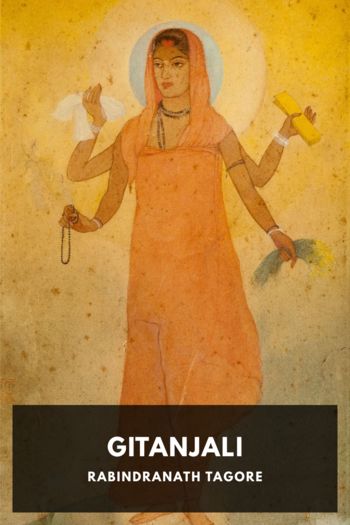My Reminiscences - Rabindranath Tagore (best ereader for pc txt) 📗

- Author: Rabindranath Tagore
Book online «My Reminiscences - Rabindranath Tagore (best ereader for pc txt) 📗». Author Rabindranath Tagore
My father left his little cashbox in my charge. He had no reason to imagine that I was the fittest custodian of the considerable sums he kept in it for use on the way. He would certainly have felt safer with it in the hands of Kishori, his attendant. So I can only suppose he wanted to train me to the responsibility. One day as we reached the staging bungalow, I forgot to make it over to him and left it lying on a table. This earned me a reprimand.
Every time we got down at the end of a stage, my father had chairs placed for us outside the bungalow and there we sat. As dusk came on the stars blazed out wonderfully through the clear mountain atmosphere, and my father showed me the constellations or treated me to an astronomical discourse.
The house we had taken at Bakrota was on the highest hilltop. Though it was nearing May it was still bitterly cold there, so much so that on the shady side of the hill the winter frosts had not yet melted.
My father was not at all nervous about allowing me to wander about freely even here. Some way below our house there stretched a spur thickly wooded with Deodars. Into this wilderness I would venture alone with my iron-spiked staff. These lordly forest trees, with their huge shadows, towering there like so many giants—what immense lives had they lived through the centuries! And yet this boy of only the other day was crawling round about their trunks unchallenged. I seemed to feel a presence, the moment I stepped into their shade, as of the solid coolness of some old-world saurian, and the checkered light and shade on the leafy mould seemed like its scales.
My room was at one end of the house. Lying on my bed I could see, through the uncurtained windows, the distant snowy peaks shimmering dimly in the starlight. Sometimes, at what hour I could not make out, I, half awakened, would see my father, wrapped in a red shawl, with a lighted lamp in his hand, softly passing by to the glazed verandah where he sat at his devotions. After one more sleep I would find him at my bedside, rousing me with a push, before yet the darkness of night had passed. This was my appointed hour for memorising Sanskrit declensions. What an excruciatingly wintry awakening from the caressing warmth of my blankets!
By the time the sun rose, my father, after his prayers, finished with me our morning milk, and then, I standing at his side, he would once more hold communion with God, chanting the Upanishads.
Then we would go out for a walk. But how should I keep pace with him? Many an older person could not! So, after a while, I would give it up and scramble back home through some shortcut up the mountain side.
After my father’s return I had an hour of English lessons. After ten o’clock came the bath in icy-cold water; it was no use asking the servants to temper it with even a jugful of hot water without my father’s permission. To give me courage my father would tell of the unbearably freezing baths he had himself been through in his younger days.
Another penance was the drinking of milk. My father was very fond of milk and could take quantities of it. But whether it was a failure to inherit this capacity, or that the unfavourable environment of which I have told proved the stronger, my appetite for milk was grievously wanting. Unfortunately we used to have our milk together. So I had to throw myself on the mercy of the servants; and to their human kindness (or frailty) I was indebted for my goblet being thenceforth more than half full of foam.
After our midday meal lessons began again. But this was more than flesh and blood could stand. My outraged morning sleep would have its revenge and I would be toppling over with uncontrollable drowsiness. Nevertheless, no sooner did my father take pity on my plight and let me off, than my sleepiness was off likewise. Then ho! for the mountains.
Staff in hand I would often wander away from one peak to another, but my father did not object. To the end of his life, I have observed, he never stood in the way of our independence. Many a time have I said or done things repugnant alike to his taste and his judgment; with a word he could have stopped me; but he preferred to wait till the prompting to refrain came from within. A passive acceptance by us of the correct and the proper did not satisfy him; he wanted us to love truth with our whole hearts; he knew that mere acquiescence without love is empty. He also knew that truth, if strayed from, can be found again, but a forced or blind acceptance of it from the outside effectually bars the way in.
In my early youth I had conceived a fancy to journey along the Grand Trunk Road, right up to Peshawar, in a bullock cart. No one else supported the scheme, and doubtless there was much to be urged against it as a practical proposition. But when I discoursed on it to my father he was sure it was a splendid idea—travelling by railroad was not worth the name! With which observation he proceeded to recount to me his own adventurous wanderings on foot and horseback. Of





Comments (0)